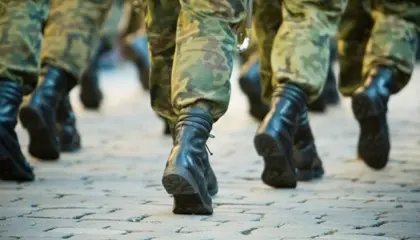The Russian State Duma almost unanimously voted to introduce a new bill on Tuesday, April 11 that would allow a conscription summons to be issued digitally.
With the Russian army facing imminent personnel shortages, the bill comes on the heels of Russian President Vladimir Putin’s March 30 pronouncement that the 2023 spring draft, which will run from April to June 15, should enroll 147,000 conscripts into the army. This is in addition to Putin’s demand that up to 400,000 “contracted” troops should be taken on this year.
- See the most contemporary Ukraine news reports for today.
- Read the most current Ukraine news stories for today.
JOIN US ON TELEGRAM
Follow our coverage of the war on the @Kyivpost_official.
A few thousand Russians of military age fled the country, after the 2022 invasion of Ukraine, with that trickle turning into a deluge after Putin announced a 300,000-man mobilization in September. It is estimated that 900,000 left Russia between August and October after Putin announced the mobilization. Many others have tried to avoid being served physical call-up papers by staying at alternative addresses.
How the new bill will work
The bill is written in such a way that there will be no way to avoid call-up. Once the enlistment notice is posted on the electronic state services portal Gosuslugi, it is considered to have been received by the individual, even if they have not read the message.
The electronic system will work alongside traditional methods of delivering conscription notices, which include personal delivery by a military recruitment official at the home or workplace, or via a certified letter and at a Multifunctional Public Services Centers (the Russian equivalent of a Citizen’s Advice Bureau).

US Must Address Russian Disinformation to Strengthen US Election Integrity
The legislation also obliges local authorities, tax offices, the police, medical organizations and other public institutions to provide all data necessary to compile an integrated database of conscripts and reservists.
The upper house, the Federation Council, is expected to approve the bill today, April 12, and send it on to President Putin for his approval. It is anticipated that the bill will be signed into law by him within days.
What is its real purpose?
Western commentators are seeing this as more than just a move to catch draft dodgers, but actually signals the start of a fresh wave of mobilization. This was denied by the Kremlin.
Dmitry Peskov, Putin’s press secretary denied this was a plan to conduct a second wave of mobilization, saying the new amendments were purely necessary to “perfect and modernize” the country’s military call-up system. “This work is absolutely necessary,” he told reporters.
Andrei Kartapolov, chairman of the defense committee of Russia’s lower house, said before the vote that the new rules would apply not only to young conscripts but all men liable for military service, including those with a reservist obligation.
Asked what would happen if the intended recipient of electronic call-up papers did not check his account, Andrey Lugovoy, a Deputy in the State Duma and a suspect in the 2006 poisoning of Alexander Litvinenko, said: “That’s his problem!”
The bill was only submitted to the Duma a few hours before the vote on it was called. In response to complaints about the short notice, Vyacheslav Volodin, speaker of the house, suggested that anyone who was unhappy should “enlist and stand shoulder to shoulder with those fighting” in Ukraine.
What happens if you don’t turn up?
Under the law, a failure to respond to the call up will result in wide-ranging restrictions. Those served a draft notice are banned from leaving Russia with effect from the day the notice was delivered.
Additionally, any conscript who fails to respond to the summons within three weeks, will have their driver’s license suspended, be banned from applying for loans, and from selling, buying or renting property. If imposed, these restrictions would be lifted within 24 hours of reporting to the recruitment office.
Georgy Alburov, an ally of Alexei Navalny, the jailed opposition leader said: “All it took is one year and a month to move from ‘only professional soldiers are carrying out tasks in Ukraine’ to ‘you’re going to be barred from travelling, will lose your driver’s license, business and money unless you go in for the slaughter.’”
You can also highlight the text and press Ctrl + Enter






